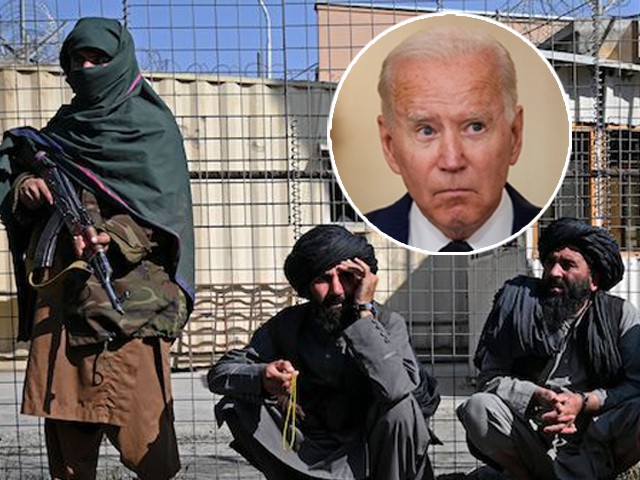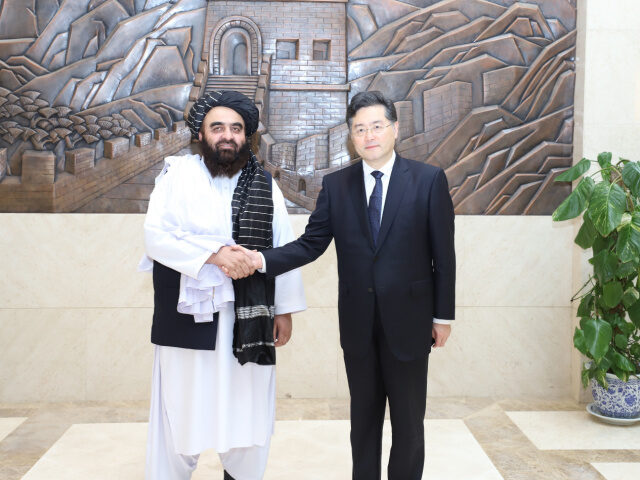The Taliban terrorist organization, which currently functions as the uncontested government of Afghanistan, agreed this weekend to join communist China’s Belt and Road Initiative (BRI).
The agreement occurred during talks this weekend between the foreign ministers of both countries, Qin Gang and Amir Khan Muttaqi, and their Pakistani counterpart, Bilawal Bhutto Zardari, hosted by Islamabad. China is one of the few countries in the world to formally recognize the Taliban, albeit as an “interim” government, as the legitimate governing entity of Afghanistan.
While most statements from the meeting did not mention the BRI by name, the Taliban reportedly agreed to join the China–Pakistan Economic Corridor (CPEC), the local sector of the BRI.
“The two sides agreed to continue their humanitarian and economic assistance for the Afghan people and enhance development cooperation in Afghanistan, including through extension of CPEC to Afghanistan,” Pakistan’s Foreign Ministry said in a statement, according to India’s WION outlet, referring to Pakistan and China:
The Taliban’s Bakhtar News Agency reported that Qin “emphasized the expansion of relations between China and Afghanistan in various sectors including investment, trade, and transit” during talks with Muttaqi and specifically promised that the Chinese Communist Party was “ready to support” the reconstruction of the nation’s capital, Kabul, after two decades of war.
The Chinese government’s Xinhua news agency did mention the BRI, claiming that Muttaqi hoped to see Taliban terrorists “strengthen cooperation” with China under the “framework” of the program.
“Afghanistan hopes to strengthen cooperation with China in such fields as economy, trade, people-to-people exchanges,” Xinhua relayed, “and infrastructure within the framework of the Belt and Road Initiative to safeguard common interests and benefit the two peoples, Muttaqi said”:
The BRI is a global program in which China offers loans to impoverished countries meant to be used to pay China to develop expensive infrastructure projects. When the countries inevitably fail to manage to pay the loans, reportedly featuring high interest rates and other predatory provisions, the Chinese Communist Party seizes the projects, giving Beijing a foothold in that country and eroding its sovereignty. Among the countries most negatively affected by the BRI are Sri Lanka, which lost control of its critical Hambantota port for nearly 200 years, and Kenya, which has seen a surge in racist attacks on locals by Chinese nationals since signing onto the plan.
Officially, China claims the objective of the BRI is to reconstruct the Ancient Silk Road, a trade route connecting China to Europe. Beijing has stated its intent to create a modern route connecting the Chinese capital to Western Europe, despite the prevalence of BRI projects in regions far from the original Silk Road in Latin America and sub-Saharan Africa.
China is currently committing genocide against majority Muslim ethnic groups in occupied East Turkistan, on the other side of the border from the Taliban’s Afghanistan. While the Taliban is a jihadist terror organization, it has not only failed to object to the slaughter of Muslims by its next-door neighbor, but vowed to support Beijing’s efforts in exchange for financial support.
“China, our great neighboring country, can have a constructive and positive role in the reconstruction of Afghanistan and also in the economic development and prosperity of the people of Afghanistan,” Taliban spokesman and current United Nations envoy Suhail Shaheen said shortly after the group’s return to power in 2021. “It is expected [that] China [will] play its role.”
“Afghanistan supports China’s major Belt and Road Initiative and is keen to see Afghanistan play a useful role in regional integration through this project,” Muttaqi affirmed in early 2022.
Following Muttaqi’s visit to Pakistan, the Taliban’s Ministry of Industry and Commerce announced that Chinese government-approved companies had already committed to as much as $2 billion in investments in Afghanistan since August 15, 2021, when the Taliban took over the country.
“The contracts have been signed for the extraction of mines, in areas of providing services at the airports, and the formation of industrial parks,” Ministry spokesman Akhundazada Abdul Salam Jawad said this weekend, according to Afghanistan’s Tolo News network. “Practical work has begun and total investment is reaching $2 billion. There will be contracts for the modernization of customs offices and other areas with foreign companies.”
The Taliban jihadist group ruled Afghanistan for much of the 1990s and lost power following the American invasion in late 2001, a response to the September 11 Islamist massacres in America that year. The group seized Kabul and sent the then-government of the country fleeing in August 2021 after leftist American President Joe Biden broke a deal with the jihadists, brokered under predecessor Donald Trump, to end the American military presence in the country on May 1 of that year.

Taliban fighters stand guard at an entrance gate of the Sardar Mohammad Dawood Khan military hospital in Kabul on November 3, 2021, a day after an attack claimed by the Taliban’s hardline rivals the Islamic State-Khorasan (IS-K), in which at least 19 people were killed (Wakil Kohsar/AFP via Getty Images). // Insert: President Joe Biden speaks about the situation in Afghanistan in the East Room of the White House on August 26, 2021, in Washington, DC (Drew Angerer/Getty Images).
The Taliban responded to Biden extending the 20-year-old war by launching a nationwide campaign against the weak Afghan National Defense and Security Forces (ANDSF), whose members mostly fled across the border to other countries. Then-president Ashraf Ghani fled Kabul without a fight on August 15.

COMMENTS
Please let us know if you're having issues with commenting.